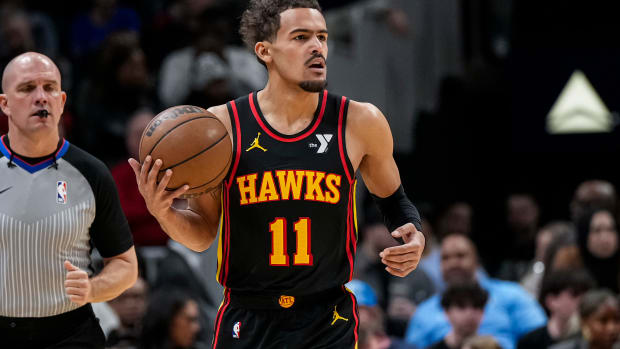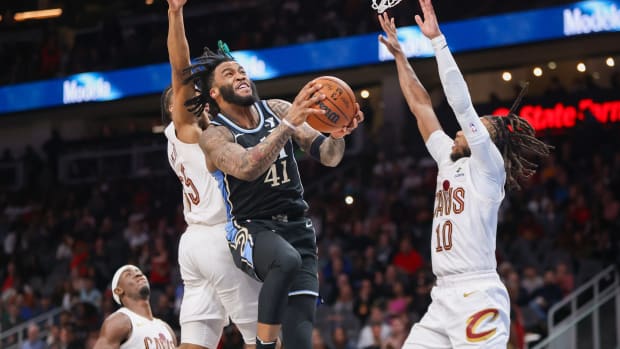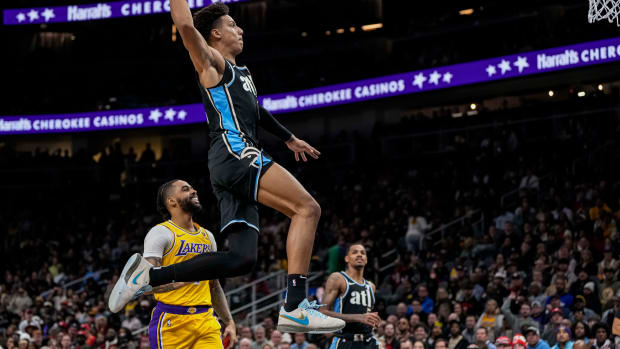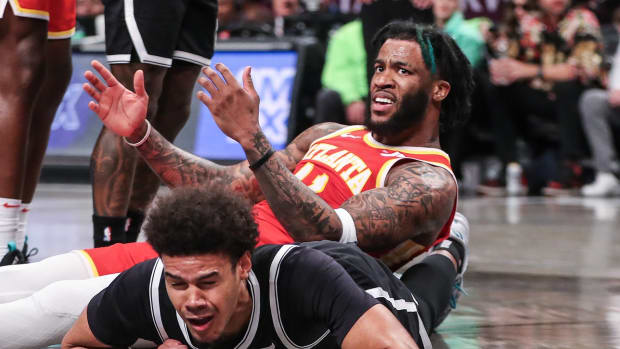'We Don't Know How to Separate': Hawks' Lead Slips in Seventh Straight Loss
Atlanta’s newfound ability to start games strong seems to have come at the expense of being able to close them. The Hawks have now lost 13 of their last 15 games, including seven in a row. Depending on the game, they lack either the energy to start games or the endurance to finish them. After a long stretch of lifeless first quarters, Atlanta has led at the half in each of its last two games, and took a 10-point lead into halftime against the Timberwolves Monday night. But as was the case Friday in Detroit and Saturday against the Raptors, that early run dissipated until it ended in a stinging loss.
The opening 24 minutes of Monday’s 125-113 loss to the Timberwolves was perhaps the most complete stretch of basketball Atlanta has played during its losing streak. Trae Young carved up Minnesota’s defense for 21 points and seven assists in the first half, balancing out stepback 3s with patient drives and towering lobs to big men. Atlanta scorched its way to a 124.0 offensive rating and 61 percent effective field goal percentage going into halftime, and managed to hold the Wolves’ offense in check.
But once the Hawks jumped out to an early lead, they simply couldn’t maintain the focus and execution that got them there. Karl-Anthony Towns exploded for 28 points, 13 rebounds, and eight assists, and Atlanta only amplified his dominance with its own wayward play. The Hawks turned the ball over on 17 percent of their possessions and allowed the Wolves to rebound nearly 14 of their own misses. The more the Hawks pushed to stay in the game, the more it got away from them.
“Undisciplined play kind of summed up the rest of the night,” Lloyd Pierce said. “We had a lot of undisciplined plays.” His team began to rush on offense and improvise defensive coverages, which helped fuel Minnesota’s 39-point third quarter – including 15 from Towns alone. The Wolves identified and widened the cracks in Atlanta’s defense until wide-open 3s and layups materialized. “We’re leaving strong-side shooters, we’re double-teaming in the post when we weren’t in that coverage,” Pierce said. “Blitzing [Towns] in the second half wasn’t the plan, and because there were some cross-matches, guys just overreacted to the situation and we got caught.”
Young, who finished with 37 points and nine assists, had just two dimes in the second half; that curbed Atlanta’s entire offense because, well, Young is its entire offense at the moment. The Hawks’ 17 turnovers fall partially at his feet, but a point guard can only be so protective of the ball when he has this little space and playmaking around him. Pierce used Jabari Parker at center in the second half to help generate offensive space and movement. And while Parker finished with 22 points on 9-of-15 shooting, those small lineups were exactly as bad as one might expect on defense. “We needed a lineup that we could just switch [screens], and that didn’t work very well,” Pierce said. “We don’t have any other small-ball fives, and [Parker] was the opportunity for us to keep DeAndre’ [Bembry] out there and keep some shooters out there and let him play with [Minnesota’s] smaller lineup.”
Atlanta does, in fact, have another small-ball center – one who is currently serving a 25-game suspension for violating the NBA’s anti-drug policy. John Collins couldn’t have picked a worse stretch to miss, and the Hawks are feeling his absence in the loss column. Atlanta endured the most difficult schedule in the NBA without its second-best player, who acted as the skeleton key for the team’s most dynamic lineups. Collins is the best shooter and rim-runner in the Hawks’ frontcourt and gives Pierce a steadier option at center than Damian Jones, Alex Len, or Bruno Fernando. Kevin Huerter’s seven missed games have also removed a key shooter and secondary playmaker, but Huerter didn’t make the choice to strain his rotator cuff.
Without their frontcourt linchpin, the Hawks have simply been unable to weather dry spells or sustain hot streaks. Their inconsistency manifests from quarter to quarter, but fluctuations in effort and execution can be seen even on a per-possession scale. “It’s frustrating,” Young said. “We’ve been playing 24 [minutes], we’ve been playing three quarters and just won’t finish it. But also finishing shot clocks… that’s draining for the defense. When you’re in that moment and they get an offensive rebound and they score, you just don’t have energy.”
The importance of learning how to win can be an overwrought trope in professional sports, but in some cases, it holds truth. The ability to close games like Monday’s takes time takes time, and it’s what distinguishes established playoff teams from unpracticed, erratic ones. Holding onto double-digit leads often doesn’t require anything more than sustaining that which built the lead in the first place. “You look at championship teams, and they just don’t have close games,” Pierce said. “When you have a lead you just separate, you don’t keep it a close game. When we have a lead, we don’t know how to separate.”
Most teams in the Hawks’ position don’t, and Atlanta showed its age on Monday. Winning in the NBA demands consistency and discipline, which too often eludes the young Hawks. Wednesday night in Milwaukee, they’ll keep searching.
“We just need to win a game,” Pierce said. “We need to be able to put together a 48-minute game, and once we do that I think everything will settle back in.”





